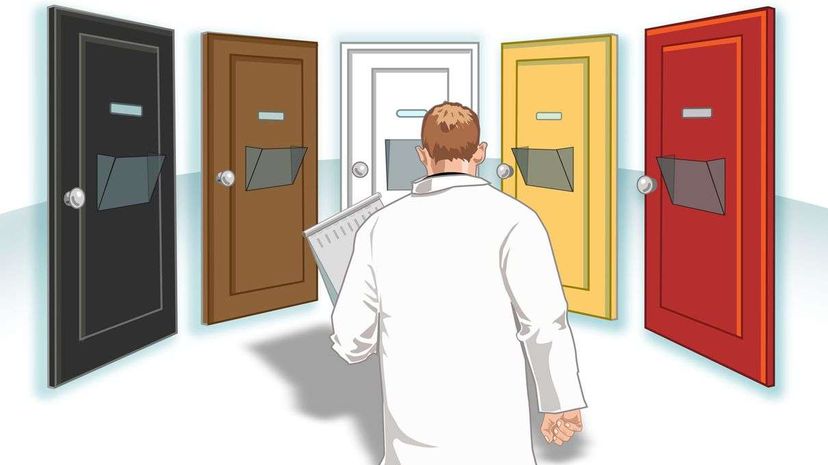
Years of playing basketball had given Damon Tweedy some bum knees. When the swelling didn't go down on his left knee after a few days, he went to an urgent care clinic for treatment. It was his day off, and he was dressed in a T-shirt and sweatpants.
"The doctor never looked at me," he remembers. "He just had me stand up, looked at my knees and then said, 'You'll be OK. Take it easy.' He never even asked what kind of job I had." What if Tweedy's job required a lot of moving around?
Advertisement
In a way it did. Damon Tweedy is a doctor himself, and once he made that clear to the physician who was treating him, everything changed. The doctor made eye contact and started asking him questions. He even took Tweedy to get an X-ray.
"So it was an example of two different levels of care. I was two different people. First time, I was Damon Tweedy, random black guy, not to be taken seriously. In the second case I was Damon Tweedy, M.D., and worthy of the same care as anyone else," he says.
Tweedy told his story at the Decatur Book Festival in Georgia in September and has written a book that is part memoir and part discussion of bias in medicine called "Black Man in a White Coat."
Unconscious Bias
Not every medical misstep has to do with the accidental slip of a scalpel or a medication dosing error. The unconscious biases that everyone possesses to one degree or another can impact how a doctor cares for a patient.
Wholly separate from personally accepted prejudices, like overt racism or homophobia, unconscious biases are just that — biases that we don't even know we have, yet can subliminally impact how we treat others. “They're so deep within our psyche that we're unaware of their existence,” explains Rene Salazar, M.D., professor of clinical medicine and director of diversity in the Department of Medicine at University of California, San Francisco.
Cognitive biases, or distortions of thinking, are hardwired functions of the human brain, which can occasionally interfere with a doctor's ability to reach a correct diagnosis, says Gordon Wallace, M.D., with the Canadian Medical Protective Association (CMPA) in an email interview. Racial bias is probably the most commonly studied type; however it's possible to harbor unconscious biases against all kinds of people, including the obese, gays and others.
Cognitive bias isn't as obvious or easy to pinpoint in a clinical setting because it isn't intentional. Many studies have been conducted to determine whether or not doctors possess unconscious biases, but one published in the Journal of General Internal Medicine took it a step further to measure how these biases would actually affect treatment.
In the study, physicians using an online tool were presented with randomized black and white patients showing signs of coronary artery disease. The doctors assessed the patients and recommended a course of treatment for each, but the results showed that doctors more often suggested thrombolysis (treatment to break up blood clots) to the white patients, while the black patients were left with less aggressive options. The researchers drew the conclusion that unconscious biases can impact the types of treatments prescribed to patients, even when they present the same symptoms as others.
Changing Strategies
So, if doctors are completely unaware of their biases, how can they possibly change their patient care strategies? Many turn to the Implicit Association Test (IAT), a respected tool that assesses and reports on unconscious bias.
“What we find is most often is there is a disconnect between what people explicitly feel and what they feel unconsciously,” Dr. Salazar says. Once the results are available, it's easier to be aware of personal cognitive biases and take steps to minimize them.
Many medical schools and hospitals are establishing curricula to better train doctors on how to avoid the pitfalls of cognitive bias, offering seminars and encouraging the use of the IAT assessment tool. The Canadian Medical Protective Association also backs up recommendations by expert Pat Croskerry, M.D., Ph.D., an emergency physician and psychologist at Dalhousie University in Halifax, Nova Scotia, Canada.
Croskerry suggests group decision-making and consultation and the use of mindful reflection and slowing down strategies, to help the doctor deliberately transition from intuitive (bias-riddled) thinking to a more analytic mode.
Following checklists and computerized decision support systems also helps to remove the human element, and experts suggest abiding by general rules of thumb to avoid bias impact. For example, anyone exhibiting specific neurological symptoms should always have their blood sugar tested.
Self-awareness also is key to avoiding medical bias. “Just by knowing that these biases are there we can really take steps to reduce the impact,” Salazar explains. “Let me stop that process right now and make sure that I go in with a clean slate and provide care with as open a mind as possible.”
From a patient perspective, it's not always going to be easy to figure out if a medical provider is unconsciously biased against you or a family member. To avoid being swept under the rug, ask questions and document the answers, and never be afraid to request an additional opinion or consult.
Advertisement
